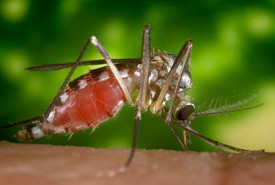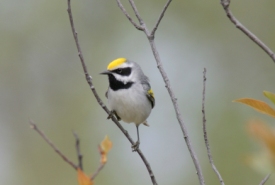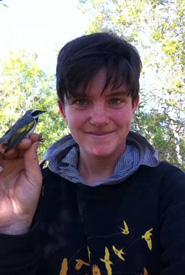Internal parasites and the conservation of birds

Mosquito (Photo from The Weather Network)
Most people, especially Canadians, know how annoying being swarmed by mosquitoes in the early summer can be. There is nothing quite like braving clouds of host-seeking insects while exploring our beautiful forests. However, while most of us can retreat to a tent, car or house if we get tired of being bitten, wild birds aren’t so lucky.
Despite not having access to a can of Off!, our feathered friends do have some defenses against insects. Some species secrete insect-repelling odours and many deflect invaders with their bills. However, biting insects still frequently target birds, and the irritation from being bitten is compounded by the potential exposure to blood parasites.
Canadians have it relatively easy when it comes to insect-transmitted parasites (malaria was eradicated from Canada in 1950), but birds in Canada are at risk of contracting avian malaria and other closely related blood parasites. The lab I work with at the University of Manitoba recently screened a small number of resident black-capped chickadees for blood parasites, and we noticed that more than half of the birds were infected. Since these birds do not migrate, they must have acquired these infections within Manitoba.
While it can be hard to think of blood parasites as a healthy and normal part of an ecosystem — they are! Most animal species have adapted to blood parasites throughout their evolutionary history and have had time to build immunity against them. These sublethal infections may still have consequences for their hosts, but they are just another part of our local, natural ecosystem, and add an invisible layer of biodiversity to the ecology of our world. For example, in our lab’s study on blood parasites of golden-winged warblers, we noticed that some populations across Canada have highly diverse parasite communities. The Manitoban population haboured one rare and unique parasite lineage that has never before been recorded, and may even be an undocumented species of parasite.

Golden-winged warbler (Photo by Christian Artuso)
This diverse community of microscopic organisms shouldn’t be a concern under normal ecological conditions, but can become an immense threat when humans disrupt local ecosystems. Hawaii provides a stark example of this when, in 1926, an insect capable of transmitting avian malaria was introduced to the island chain. In this case, the mosquito acts as a vector. A vector is an organism that does not cause disease itself, but spreads infection by conveying pathogens from one host to another. Experts believe that the historical absence of this vector is what prevented the malarial parasites from being transmitted between migratory birds and the malaria-free resident species. The introduction of this new vector in Hawaii, much like when a new species is introduced to an ecosystem, caused a catastrophic avian malaria outbreak that resulted in the extinction and imperilment of several bird species in the area.
On a larger scale, climate change is also expected to affect host-parasite dynamics. Our warming climate has already made northern habitats more suitable for southerly vector species, likely causing southern parasites to spread into the north. Because northern species have not evolved with these southern parasite species, the repercussions of this contact could be detrimental to bird species, some of which may also face climate change-induced habitat loss.
Though less extreme, even when birds have a long evolutionary history with their parasites, urbanization can disrupt host-parasite relationships. Humans can increase parasite transmission through creating vector habitat (through irrigation or other artificial water sources), or reduce vector populations by draining wetlands or using pesticides. Human disturbance may also compromise the immune systems of local animals if we reduce the quality of their habitat and force birds to use their limited available resources toward survival and reproduction instead of immune defense against parasites.
Through our study in Manitoba, we found that local livestock grazing increased the prevalence of one type of blood parasite for golden-winged warblers, possibly due to high vector presence in these areas.
Avian blood parasites are normal components of many ecosystems, but their effects on local species may be made worse by the increasing human impact, such as urbanization and pollution, occurring around the world. Because land conversion, introduced species and climate change affect nearly every ecosystem across the globe, continually monitoring how these disturbances affect all ecosystem interactions — including host-parasite dynamics — is vital.


